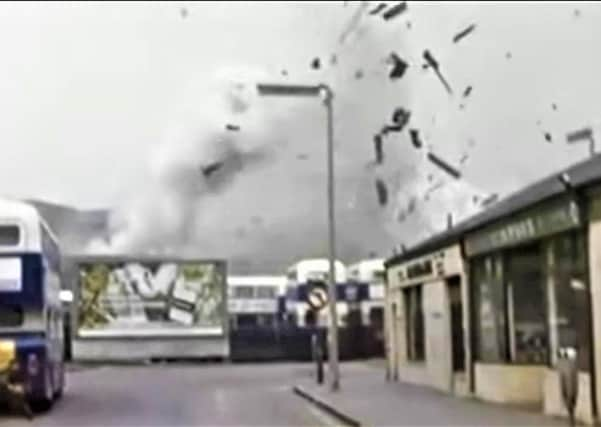Ex-terror detective: Amnesty dancing on graves of victims


William Matchett, who spent two decades pursuing paramilitaries with the RUC’s Special Branch, said the proposals for a de facto amnesty go radically against the basic instincts of all police officers, and play into the hands of republicans.
The story had been unofficially floated on Tuesday afternoon by the government, ahead of being presented to the House of Commons yesterday.
Advertisement
Hide AdAdvertisement
Hide AdIt means that all unsolved murder cases will stay unsolved, forever – ranging from single attempted murders, to the INLA attack on Darkley gospel hall (where a team of shooters killed three worshippers) and Bloody Friday (a near-simultaneous IRA bombing of 22 location in Belfast, killing nine).
Mr Matchett was just one of a number of voices expressing dismay at the plan, which has united usually disparate elements like Amnesty International, the DUP, and Sinn Fein together in condemnation.
Mr Matchett joined the RUC in 1982, spent 20 years in it, then 10 in the PSNI. For about two decades he worked in the anti-paramilitary division, Special Branch, and left with the rank of detective inspector.
“I think it’s predictable,” he told the News Letter.
“When you look at the whole political and moral trajectory since Easter 1998, it’s the same path.
Advertisement
Hide AdAdvertisement
Hide Ad“It’s a complete travesty to put a statute of limitations on murder.
“I think it goes against every moral fibre in any cop’s body.
“It doesn’t matter who you are, what you belong to – if you planned murder and engaged in murder, you should always be thinking the long arm of the law is right behind you.
“And if all of a sudden you’ve got significant new evidence, and the suspects are still alive, you go for it.
Advertisement
Hide AdAdvertisement
Hide Ad“I think innocent victims need that hope. They need to see the state hasn’t forgotten about their loved ones.
“When you extinguish that hope, I think you’re really dancing on people’s graves – I really do.”
He said the whole episode has put the Westminster government’s “legendary disinterest” in Northern Irish affairs on stark display – saying that it was media coverage of English soldiers in Belfast courts that “kicked Westminster into action”.
Now, thanks to the government’s proposals, the prospect of further news headlines about British soldiers facing charges has been “taken off the political table – and it confines all the fallout, once again, back here” in Northern Ireland.
Advertisement
Hide AdAdvertisement
Hide AdIn shielding both soldiers and paramilitaries from investigation, it feeds into what Mr Matchett said is a very successful narrative spun by republicans, namely that “one side is as bad as the other”.
“It’s just total and utter nonsense, and it’s insulting,” he said. “The Provisional IRA [ran] the worst campaign of murder in western Europe since the Nazis. And they had a propaganda front that was superb in excusing what they did.
“It was a 30-year crime scene they opened up, of mass murder and extensive criminal damage. Now they’re saying basically forget about it. I think the republican movement has played a blinder.”
He concluded: “God, you need some resilience to live in this place, don’t you?”
Advertisement
Hide AdAdvertisement
Hide AdHere is just a handful of the reaction to emerge yesterday on the subject.
> Padraig Yeates, an academic and ex-member of the republican movement (the Officials, not Provisionals), had previously written in the News Letter his support for a “conditional amnesty” – where perpetrators “seek an amnesty on condition of engaging meaningfully with victims”.
Yesterday he said a “truth recovery process” remains “the best hope for victims and survivors” to find the truth – but that a blanket amnesty for perpetrators “would remove the most powerful incentive” many of them have for getting involved in such a process.
“Like some previous proposals, they may well prove incompatible with Britain’s international commitments under the Belfast Good Friday Agreement, and may fail to comply with its obligations under the European Convention on Human Rights.”
Advertisement
Hide AdAdvertisement
Hide Ad> Mark Lindsay MBE, head of the Police Federation (representing rank-and-file officers) said: “Having a cut-off of 1998 means the relatives of hundreds of police officers murdered during the Troubles will potentially be denied justice ... this is after hundreds of terrorists were released back into society and many terrorist suspects given letters of comfort or pardons.”
He added that he is “not happy that this legislation could be seen to create equivalence between terrorists and police officers who worked tirelessly to save lives – any such link would be abhorrent”.
> Grainne Teggart, Amnesty International’s Northern Ireland campaign manager, said: “The UK government is showing an appalling and offensive disregard for victims; grossly dismissing their suffering and rights to truth, justice and accountability.
“In pursuing a statute of limitations to put state forces and other perpetrators above the law and beyond accountability, government debases natural justice.”
Advertisement
Hide AdAdvertisement
Hide Ad——— ———
A message from the Editor:
Thank you for reading this story on our website. While I have your attention, I also have an important request to make of you.
With the coronavirus lockdown having a major impact on many of our advertisers — and consequently the revenue we receive — we are more reliant than ever on you taking out a digital subscription.
Advertisement
Hide AdAdvertisement
Hide AdSubscribe to newsletter.co.uk and enjoy unlimited access to the best Northern Ireland and UK news and information online and on our app. With a digital subscription, you can read more than 5 articles, see fewer ads, enjoy faster load times, and get access to exclusive newsletters and content. Visit https://www.newsletter.co.uk/subscriptions now to sign up.
Our journalism costs money and we rely on advertising, print and digital revenues to help to support them. By supporting us, we are able to support you in providing trusted, fact-checked content for this website.
Alistair Bushe
Editor